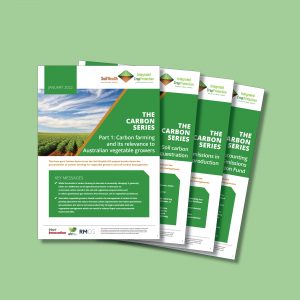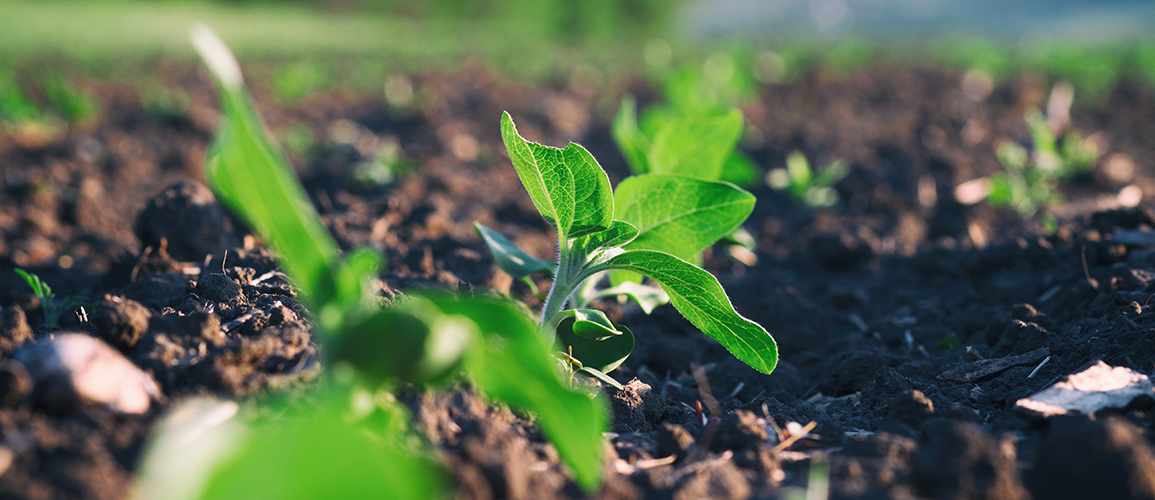Introducing the Carbon Series for Aussie vegetable growers
The Soil Wealth and Integrated Crop Protection (ICP) project works with growers to put soil management and plant health research into practice. To kick off 2022, the Soil Wealth ICP team has developed the Carbon Series to provide a high-level overview of carbon farming in Australia and how it can apply to vegetable growers, particularly through improved soil carbon management practices. Soil Wealth ICP Phase 2 (VG16078) is a strategic levy investment under the Hort Innovation Vegetable Fund.
Phrases such as ‘carbon neutral’, ‘carbon accounting’, ‘soil carbon sequestration’ and ‘carbon emissions reduction’ are becoming increasingly common when policymakers talk about Australian agriculture. These terms can be summarised under the heading of ‘carbon farming’.
Carbon farming in Australia is constantly changing. Generally, it refers to a deliberate set of agricultural practices or land uses to increase carbon stored in the soil and vegetation (sequestration), and reduce greenhouse gas emissions from livestock, soil or vegetation (avoidance).
Carbon farming can offer landholders financial incentives to reduce greenhouse gas emissions within their production system or sequester carbon, in addition to achieving economic and environmental co-benefits through increased productivity and sustainability.
Carbon farming can range from a single change in land management – such as introducing no-till cultivation, cover crops or changing grazing management – to a whole-of-farm integrated plan which maximises carbon capture and reduces emissions.
The good news is that vegetable growers can build on their existing production processes, particularly around improving soil health, to make the transition to carbon farming. Growers should consider the management of carbon in their growing operations not only to reduce greenhouse gas emissions, but to increase productivity through sustainable soil management practices.
Carbon farming involves practices that:
- Improve the rate at which carbon dioxide (CO2) is removed from the atmosphere and converted to plant material and/or soil organic matter
- Reduce greenhouse gas emissions, measured as CO2 equivalents, from agriculture.
About the Carbon Series

A new four-part Carbon Series from the Soil Wealth ICP project breaks down the practicalities of carbon farming for vegetable growers and looks more closely at soil carbon management. It provides links to further information and project resources on the following topics:
- Part 1: Carbon farming and its relevance to Australian vegetable growers.
- Part 2: Soil carbon and carbon sequestration.
- Part 3: Carbon emissions in vegetable production.
- Part 4: Carbon accounting and the Emissions Reduction Fund.
These articles can be accessed here.
You can also tune into a podcast where the team speaks to Mulgowie Farming Company and Carbon Friendly about their journey to develop carbon neutral sweet corn in Queensland. Access the podcast here.
To wrap up the series you can watch the webinar recording on carbon management on vegetable farms – emissions, sequestration and beyond. Click here.
Food for thought
While carbon farming is a possible option for many Australian vegetable growers, the practicalities of implementing this approach on-farm will depend on the individual circumstances of each business and its goals.
Managing soil carbon – a key player in overall soil health – can increase productivity and reduce the cost of production with the added benefit of reducing greenhouse gas emissions. There may also be marketing benefits for a business and the creation of a more resilient farm from a climate and consumer perspective.
While there may not always be direct financial benefits from reducing greenhouse gas emissions and carbon sequestration, there can be co-benefits around increased resilience and sustainability including increased biodiversity and water use efficiency, and reduced waste, pesticide and fertiliser use.
To make an informed decision about carbon farming, vegetable growers will need to consider their individual business goals and production circumstances – from the scale of the business to opportunity costs of changing farming practices – and keep on top of changes in the sector as they arise.
New focus topics underway for Soil Wealth ICP in 2022!
The Soil Wealth ICP team is in full swing tackling the focus topics for the project in 2022. The team is continuing to dig into the complex world of soil biology and how it relates to the entire farming system, including its relationship with integrated crop management practices, soilborne diseases, irrigation, pest management and nutrition management.
The project is also focusing on integrated pest management (IPM) both in the field and in protected cropping systems. Growers are being taken back to basics to explain soil health’s role in IPM, discussing the management of chemicals to minimise resistance and exploring supply chain requirements including tolerance levels for the presence of beneficial insects.
You can find all new events, resources and demo site information that align with these areas of importance to vegetable growers and the wider industry at soilwealth.com.au.
Find out more
Please contact project leaders Dr Gordon Rogers on 02 8627 1040 or gordon@ahr.com.au and Dr Anne-Maree Boland on 03 9882 2670 or anne-mareeb@rmcg.com.au.
This project has been funded by Hort Innovation using the vegetable research and development levy and contributions from the Australian Government.
Project Number: VG16078

